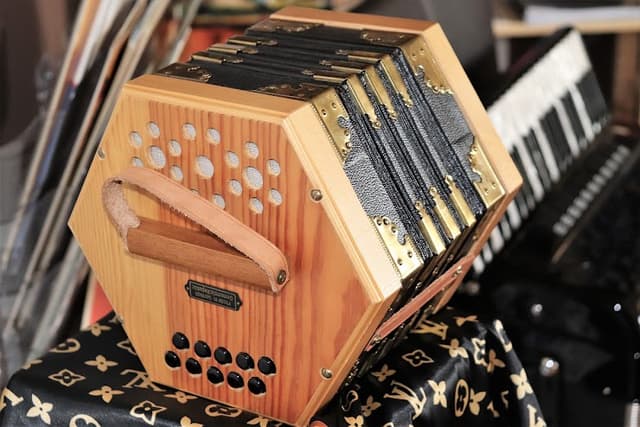Year 9
Year 9
How do the layers in tango dance come together?
These resources will be removed by end of Summer Term 2025.
Switch to our new teaching resources now - designed by teachers and leading subject experts, and tested in classrooms.
These resources were created for remote use during the pandemic and are not designed for classroom teaching.
Lesson details
Key learning points
- In this lesson, we will look at how the tango style is created through melodic layers and interesting chromatic passing notes. We will then compose our own tango melodies.
Licence
This content is made available by Oak National Academy Limited and its partners and licensed under Oak’s terms & conditions (Collection 1), except where otherwise stated.
7 Questions
Q1.
In which city in Argentina was tango created?
Mendoza
Solta
Q2.
What instrument is this?

Accordion
Guitar
Q3.
What type of dance is a tango?
Freestyle, disco dance.
Group, line dance.
Q4.
Which century was neotango developed?
17th century
19th century
Q5.
What is beatboxing?
Creating a drum from cardboard
Creating a trumpet sound with your mouth
Q6.
Which three parts of the drum kit sounds are created through basic beatboxing?
Crash cymbal, ride cymbal and snare
Floor tom, tambourine and clap
Q7.
What kind of electronic elements are included in electrotango?
Amplifiers and loudspeakers
Intro and outro
7 Questions
Q1.
What are layers in music?
The key of the music.
The structure of the piece.
Q2.
What does 'polyphonic' mean?
Multiple layers playing in unison.
One instrument playing a solo.
Q3.
Which note is sharp in the A harmonic minor scale?
C
F
Q4.
What is a chromatic passing note?
A note that finishes the piece in a different key.
A note that is played really quickly before the piece starts.
Q5.
Why is it important to write a melody in stepwise motion?
Because the melody needs to play every note of the scale in order.
Because the notes need to match the steps of the tango dance.
Q6.
What is electrotango style?
A fusion of jazz and rock music.
A fusion of traditional percussion instruments and string parts.
Q7.
Which of the following three chords were given in the tango chord progression?
C, Dm and F.
D, Bb and E.

